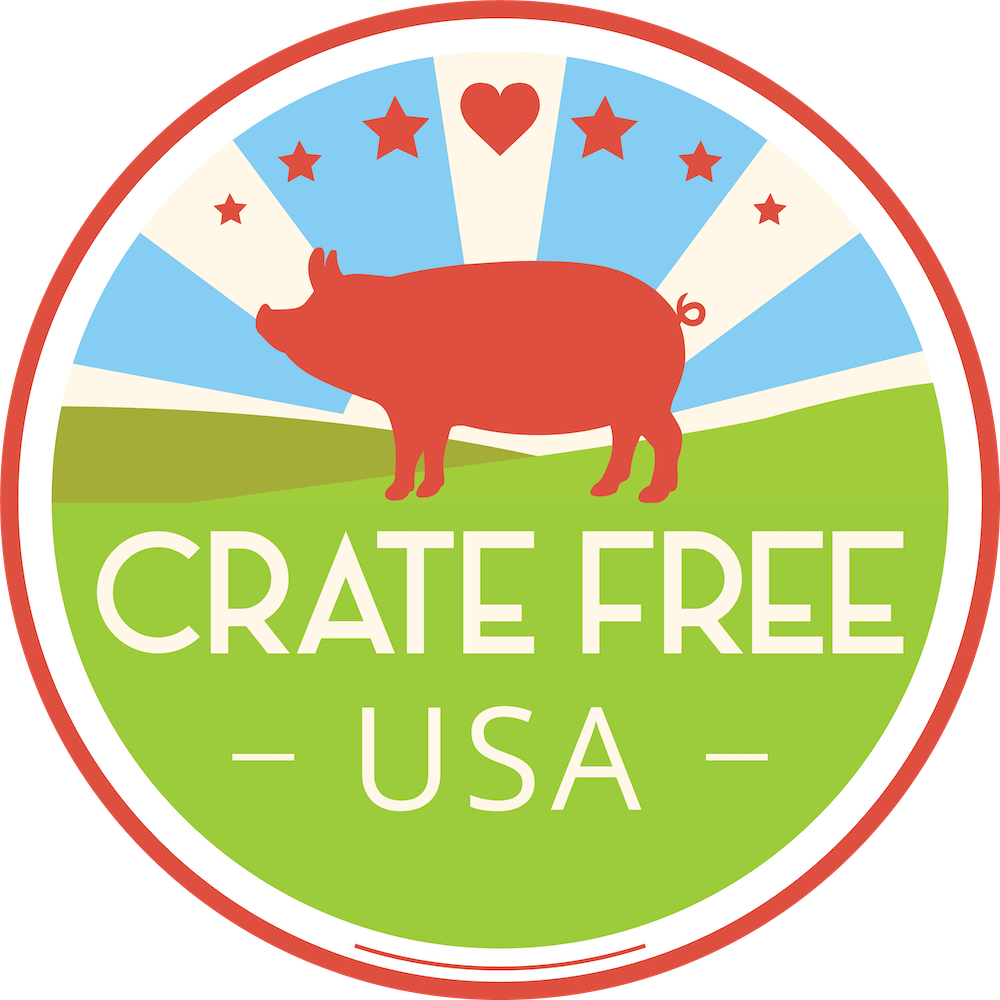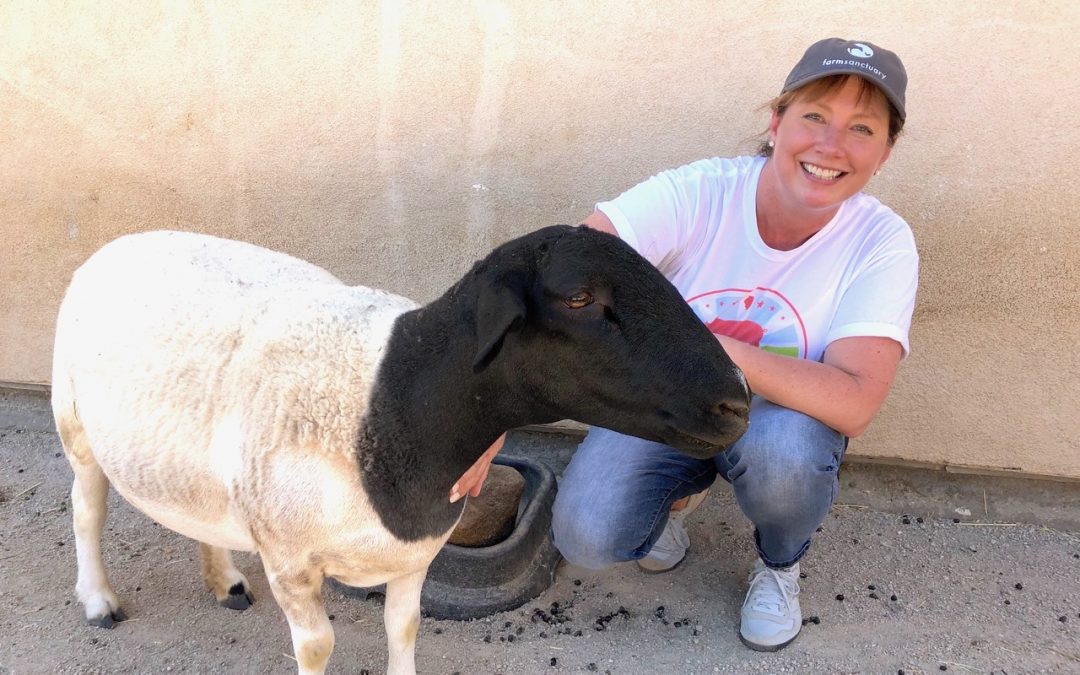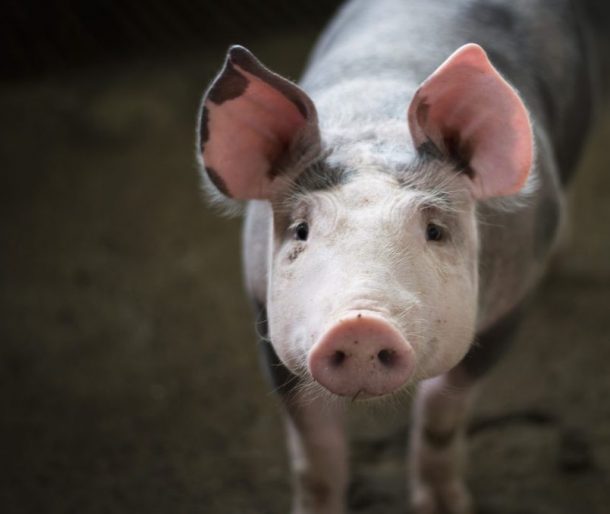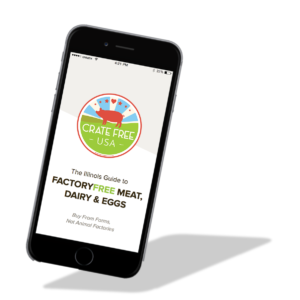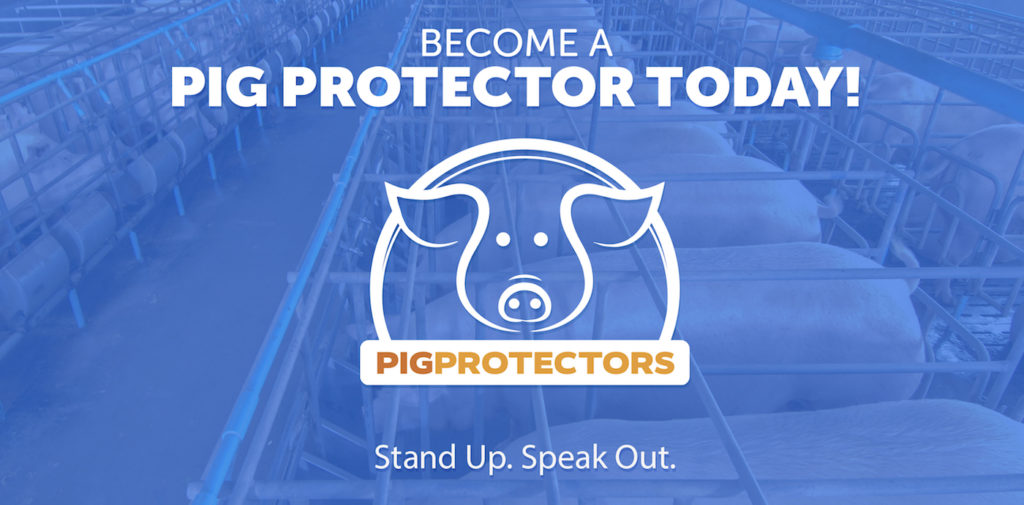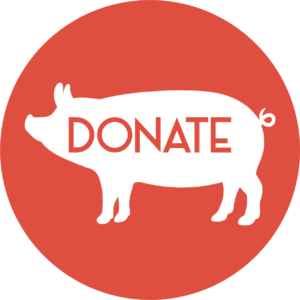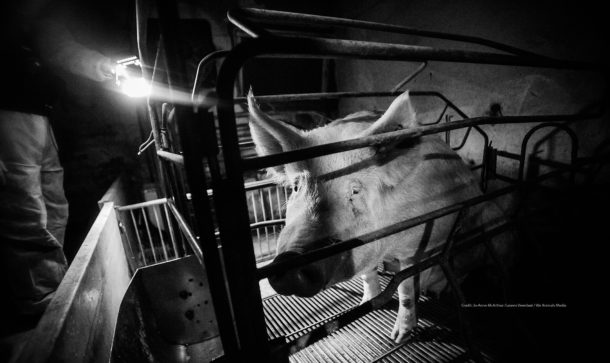Introduction
Crate Free Illinois is an entirely volunteer run organization and we rely on a dedicated and efficient team of people to advance our mission statement. Christy Slaby is one of these instrumental volunteers. Christy discovered Crate Free Illinois back in the summer of 2017 through Facebook. She decided to attend Crate Free Illinois’ Factory Farm Forum event in August of that year and resonated with our mission to reduce the suffering of animals in “animal factories.” Christy signed up to volunteer that day, and she has been a key volunteer for the organization ever since. She has served in the role of Social Media Coordinator since October 2017, helping to educate people on our Facebook page about the inherent problems in our food system, as well as empowering people to create positive change.
Why do you volunteer for Crate Free Illinois?
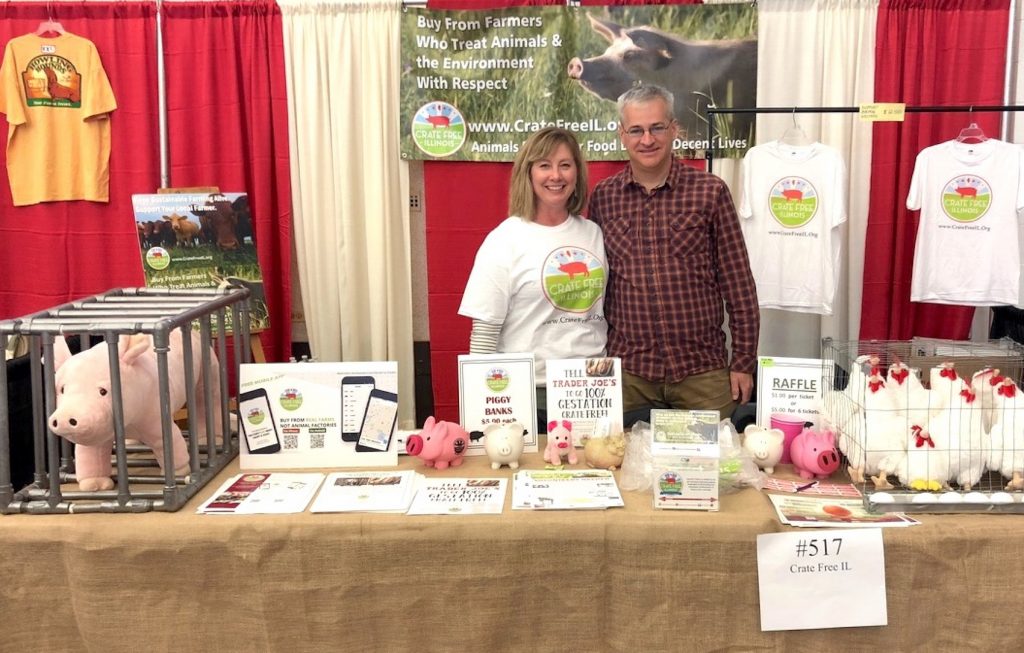
Christy and her husband at one of our events
When asked about why she was drawn to volunteer for CFI, Christy explained that she was looking for an opportunity to go beyond making a monetary donation; she was looking to get involved in farm advocacy locally in a hands-on way.
“It is ironic that, here in the heart of farm country, where farm animal advocacy is most needed, there are not really very many organizations doing this critical work.” Illinois is the fourth largest pork producer in the nation, but Christy accurately points out that there are a surprising number of people who live here, surrounded by Concentrated Animal Feeding Operations (CAFOs), who are unaware of what CAFOs are or know about the cruelty and suffering that is standard practice in the factory farming industry. Crate Free Illinois is a grassroots, local organization striving to bridge the gap between the people of Illinois and the animals raised and consumed here at such an enormous rate.
One of the significant and hands-on ways that Christy has advocated for animals with Crate Free Illinois was to help deliver the nearly 400,000 petition signatures asking Trader Joe’s to remove the use of gestation crates from their supply chain to their corporate office in Monrovia, California in 2018. She met with the VP of Marketing to discuss the issue. “There has long been frustration among animal welfare groups about Trader Joe’s lack of policy on gestation crates, so it was very exciting to be a part of an initiative that achieved success.”
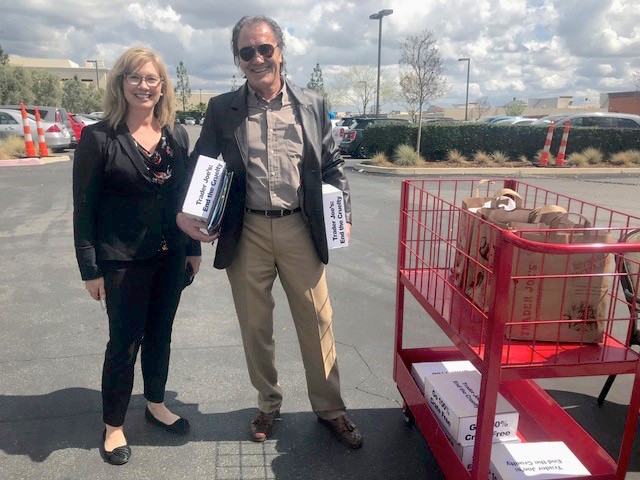
Christy and fellow volunteer deliver Crate Free’s petition to Trader Joe’s HQ in California.
How did you first learn about how animals on factory farms are treated?
Christy credits the organization Farm Sanctuary with being the first group to make her aware of factory farming. In 1999, long before the days of social media and Facebook, she received a brochure in the mail from Farm Sanctuary. Replete with color photos, the brochure described what happens to chicks in the egg industry: the horrific way the males are disposed of; the debeaking of the females; the awful conditions in which they are kept.
“I cried all the way through reading that brochure,” she says. “I ended up sponsoring a rescued chicken through Farm Sanctuary whose name was Ruby. They sent me an 8×10 color photograph of her, which I still have today. This happened just a few months prior to my wedding, and I decided that whatever we served for our meal at our reception, it was not going to be chicken, and that a vegetarian option would be included.”
To this day, Christy recalls that there is something particularly tragic about the plight of the chickens that fuels her passion for farm animal advocacy.
“They are seen as nothing by the industry that exploits and abuses them, yet they make up the greatest number of all animals slaughtered for food,” she explained. “The scope and scale of their suffering makes them the most abused animals on the planet, yet they have the least protections – almost none – of any animal.”
The Humane League corroborates this, reporting that 88% of the nearly 9 billion animals raised and slaughtered each year in the United States are chickens. Furthermore, there are no meaningful federal regulations during the breeding, rearing, sale, transportation or slaughter of these chickens.
What do you think sets Crate Free Illinois apart from other organizations?
Christy pointed out that the most significant thing that sets Crate Free Illinois apart is that we do not get caught up on labels when it comes to food preferences, or specifically advocate for a vegan diet. This methodology has drawn some criticism from other groups that strongly support a vegan approach to animal welfare activism.
“There are other organizations that approach it as a ‘zero sum game,’ but personally, I think that can make some people feel like, ‘Well, I’m really not willing to go vegan, so therefore I will do nothing,’” says Christy. “Just because you can’t do everything, doesn’t mean you shouldn’t try to do something! I think any change that lessens the suffering of animals is valuable.”
Crate Free Illinois believes that sustainable and valuable change can be made by asking people to eat less meat, educating them about animal welfare certifications, and encouraging them to source their dairy and meat from brands and farms that commit to a cruelty-free approach to raising and slaughtering their animals. See our Take Action page for more info on how you can be a part of this solution.
Why is Crate Free Illinois’ mission important to you?
“The mission of Crate Free Illinois, which is to reduce the suffering of animals on factory farms, is important because these animals are the most abused, yet least protected group of animals in the world. Farm animals make up not only one of the largest groups, but they also experience the most and the worst kinds of suffering. Yet, their plight is often largely ignored.”
Animal Charity Evaluators points out that “The magnitude of human-caused animal suffering inflicted on farm animals dwarfs all other categories. For every dog or cat euthanized in a shelter, approximately 3,400 farm and land animals are confined and slaughtered.” Additionally, around 66% of the money donated to animal charities goes to companion animal shelters, while less than 1% is donated towards farm animal organizations. It is because of these extremely imbalanced statistics that Christy feels that Crate Free Illinois’ mission is so urgent and essential.
When you’re not volunteering with Crate Free Illinois, what do you like to do?
When Christy is not working with Crate Free Illinois, she focuses on animal rescue and local welfare issues in her county. She serves on a fundraising board that supports her local animal control facility, and she has recently joined the Animal Welfare Advisory Committee, which is an ad hoc advisory group to her county board. Aside from her volunteer work, she enjoys traveling with her family, and her guilty pleasure is watching true crime documentaries.
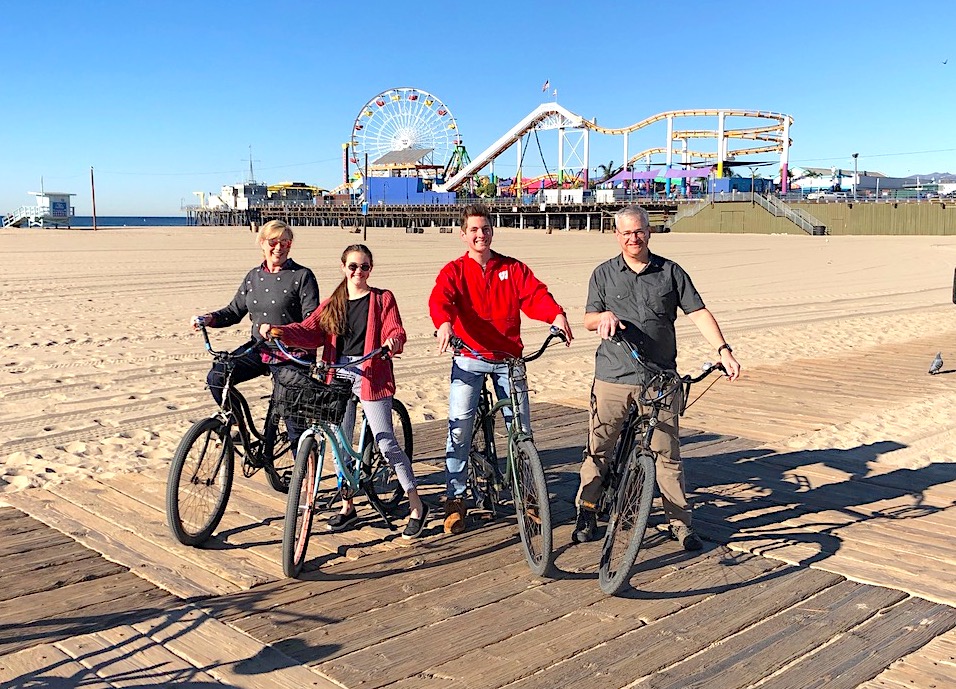
Slaby Family on bikes
Christy’s family has three rescue cats, one of which is a 10-year-old tortoiseshell cat named Lena, who “came to us as a ‘tripod’ kitty (missing her front leg).” The other two, Sylvie and Pepper, were bottle babies at a shelter she used to volunteer with. She offered to bring them home to foster them, and six years later, her family is happy with the decision they made to join the ranks of the “foster failures” club. Christy’s daughter has a two pet horses, Belle and Bo, that reside at her grandfather’s farm, and another horse, Crowd Control, that lives in Michigan that she rides for shows. She can’t imagine animals not being a part of their lives on a daily basis.
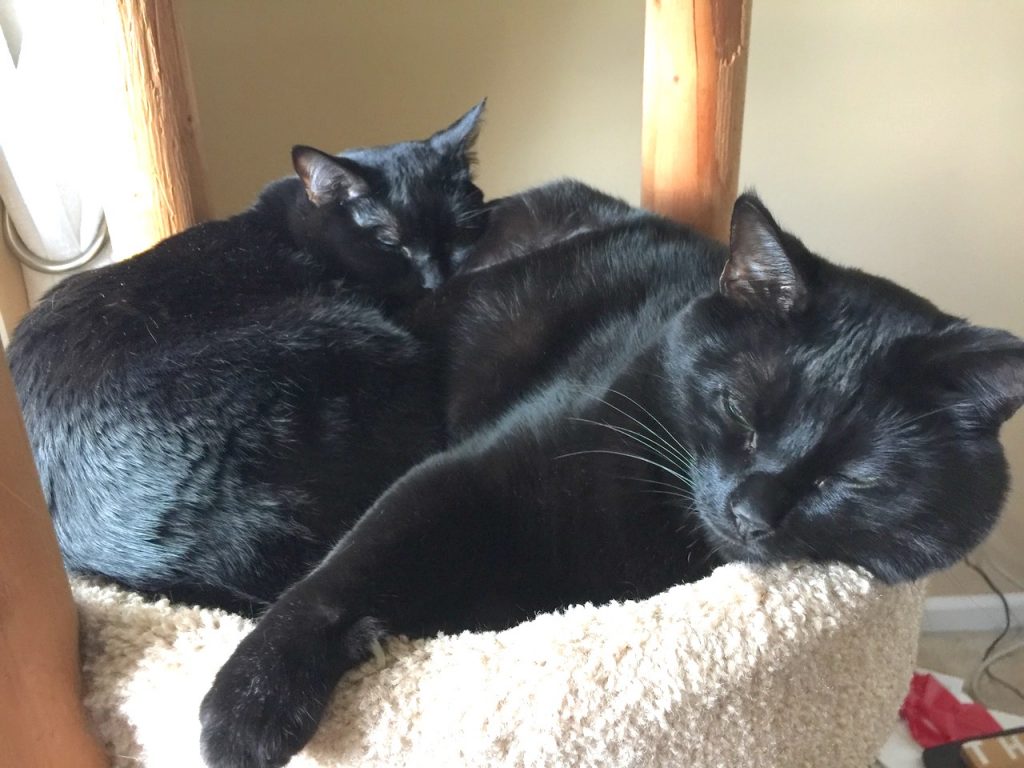
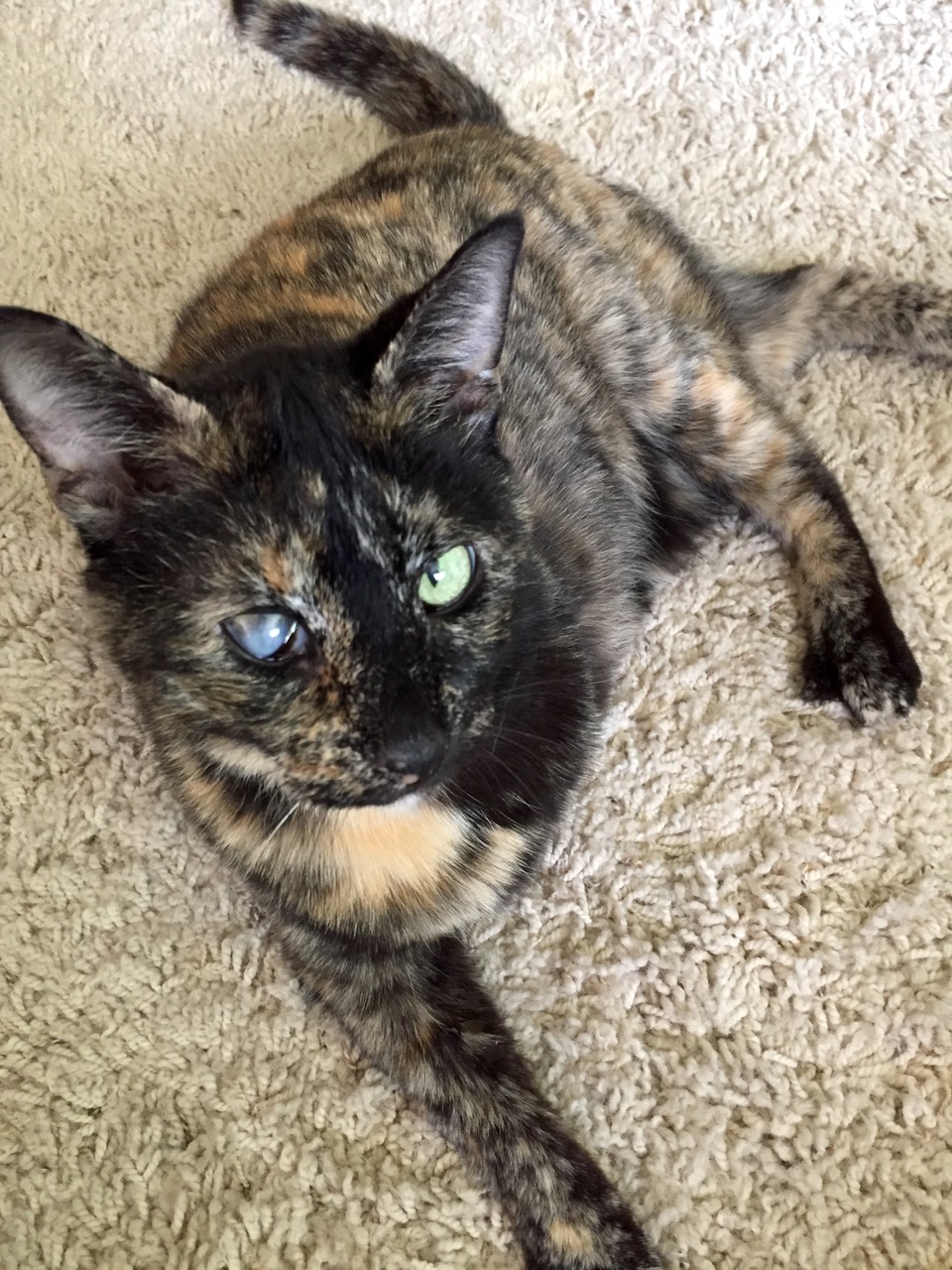
Author bio: Jessie Kirchberg has been a volunteer for Crate Free Illinois since September 2018. Jessie became involved in farm animal advocacy after the loss of her Parson Russell Terrier, Sophia Margaret. She focuses on special projects for CFI and enjoys building strategic partnerships between CFI and other farm animal welfare organizations.
